Related Research Articles

The Blue Planet is a British nature documentary series created and co-produced by the BBC and Discovery Channel. It premiered on 12 September 2001 in the United Kingdom. It is narrated by David Attenborough.

Sea Hunt is an American action adventure television series that aired in syndication from 1958 to 1961 and was popular for decades afterwards. The series originally aired for four seasons, with 155 episodes produced. It stars Lloyd Bridges as former Navy diver Mike Nelson, and was produced by Ivan Tors.

Miranda Krestovnikoff is a British radio and television presenter specialising in natural history and archaeological programmes. She is an accomplished musician, and also a qualified scuba diver which has led to co-presenting opportunities in programmes with an underwater context.
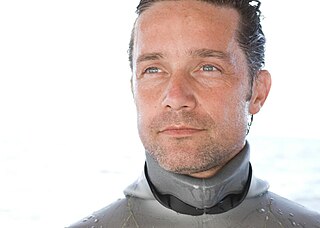
Fabien Cousteau is an aquanaut, ocean conservationist, and documentary filmmaker. As the first grandson of Jacques Cousteau, Fabien spent his early years aboard his grandfather's ships Calypso and Alcyone, and learned how to scuba dive on his fourth birthday. From 2000 to 2002, he was Explorer-at-Large for National Geographic and collaborated on a television special aimed at changing public attitudes about sharks called "Attack of the Mystery Shark". From 2003 to 2006, he produced the documentary "Mind of a Demon" that aired on CBS. With the help of a large crew, he created a 14-foot, 1,200-pound, lifelike shark submarine called "Troy" that enabled him to immerse himself inside the shark world.
Rodney Winston Fox is an Australian film maker, conservationist, survivor of an attack by a great white shark, and one of the world's foremost authorities on that species. He was inducted into the International Scuba Diving Hall of Fame in 2007. He was born in Adelaide.

Darwin Island is an isolated northern member of the Galápagos Islands in Ecuador, the uppermost extent of an extinct volcano. It has an area of 1 square kilometer (0.4 sq mi) and reaches 165 meters (541 ft) above sea level. Visits to the island are restricted by the Government of Ecuador, but scuba diving is permitted.
Ron Josiah Taylor, AM was a prominent Australian shark expert, as is his widow, Valerie Taylor. They were credited with being pioneers in several areas, including being the first people to film great white sharks without the protection of a cage. Their expertise has been called upon for films such as Jaws, Orca and Sky Pirates.

Stephen James Backshall is a British naturalist, explorer, presenter and writer, best known for BBC TV's Deadly 60.

Philippe-Pierre Jacques-Yves Arnault Cousteau Jr. is an American oceanographer and environmental activist, the son of Philippe Cousteau and the grandson of Jacques Cousteau. Cousteau has continued the work of his father and grandfather by educating the public about environmental and conservation issues. In 2017, he received an Emmy nomination for hosting the syndicated science series Awesome Planet.

Michael Rutzen is a South African conservationist, film maker, and cage diving operator.
Stanton Arthur Waterman was an American cinematographer and underwater film producer who was a five-time Emmy Award winner.
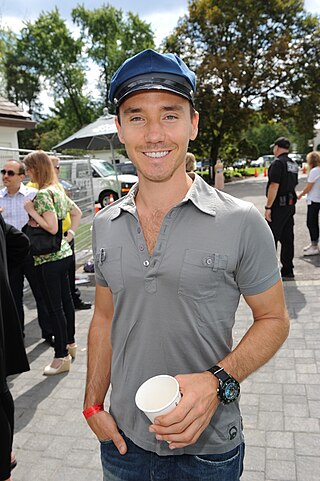
Rob Stewart was a Canadian photographer, filmmaker and conservationist. He was best known for making and directing the documentary films Sharkwater and Revolution. He drowned at the age of 37 while scuba diving in Florida, filming Sharkwater Extinction.
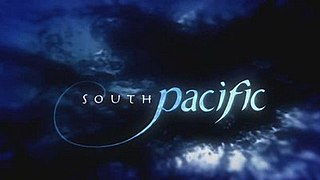
South Pacific is a British nature documentary series from the BBC Natural History Unit, which began airing on BBC Two on 10 May 2009. The six-part series surveys the natural history of the islands of the South Pacific region, including many of the coral atolls and New Zealand. It was filmed entirely in high-definition. South Pacific was co-produced by the Discovery Channel and the series producer was Huw Cordey. It is narrated by Benedict Cumberbatch. Filming took place over 18 months in a variety of remote locations around the Pacific including: Anuta, Banks Islands, French Frigate Shoals, Papua New Guinea, Palmyra, Kingman Reef, Tuvalu, Palau, Caroline Islands, Tuamotus and Tanna Island in Vanuatu.
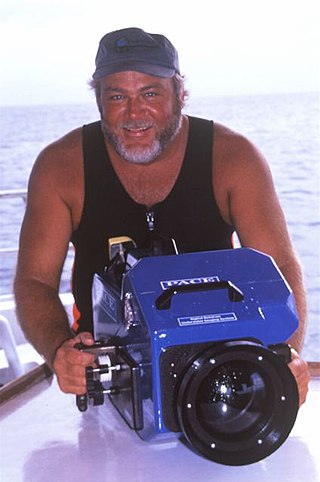
Bret Clifton Gilliam was an American pioneering technical diver. He was most famous as co-founder of the certification agency Technical Diving International along with Mitch Skaggs, and as the one time holder of the world record for deep diving on air. He is also one of diving's most popular writers. Gilliam is the author or coauthor of 72 books, over 1500 feature magazine articles, and over 100 magazine cover photos. In his diving career he has logged over 19,000 dives(NOT VERIFIED) since 1959.

The Maldives, officially the Republic of Maldives, is a small archipelagic state in South Asia. It lies in the Indian Ocean southwest of Sri Lanka and India, about 700 kilometres (430 mi) from the Asian continent's mainland. The chain of 26 atolls stretches across the Equator from Ihavandhippolhu Atoll in the north to Addu Atoll in the south. The land area is roughly 298 square kilometres. Malé is the capital.

Jonathan Bird is an American photographer, cinematographer, director and television host. He is best known for his role as the host of Jonathan Bird's Blue World, a family-friendly underwater exploration program on public television in the United States. His work is largely underwater in nature.

Jill Heinerth is a Canadian cave diver, underwater explorer, writer, photographer and film-maker. She has made TV series for PBS, National Geographic Channel and the BBC, consulted on movies for directors including James Cameron, written several books and produced documentaries including We Are Water and Ben's Vortex, about the disappearance of Ben McDaniel.
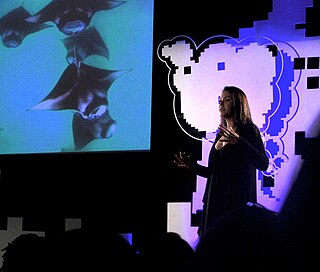
Andrea Marshall is a marine biologist known for wildlife conservation and research on large marine animals like manta rays & whale sharks. Marshall is co-founder and a principal scientist of the Marine Megafauna Foundation, where she leads many of MMF’s projects around the world.

Darwin's Arch was a natural rock arch feature to the south-east of Darwin Island in the Galápagos Archipelago in the Pacific Ocean, and is now a pillar formation. The arch sat on an irregularly shaped, rocky, submerged plateau, nicknamed "the theatre". The arch collapsed into the sea on 17 May 2021 from natural erosion.

Valerie May Taylor AM is an Australian conservationist, photographer and filmmaker, and an inaugural member of the diving hall-of-fame. With her husband Ron Taylor, she made documentaries about sharks, and filmed sequences for films including Jaws (1975).
References
- ↑ "WWII's Great Escapes" . Retrieved 5 March 2018.
- ↑ "Great Barrier Reef" . Retrieved 5 March 2018.
- ↑ "Lost Worlds Discovery". IMDb . Retrieved 5 March 2018.
- ↑ "Bedstone" . Retrieved 7 December 2014.
- 1 2 "Monty Halls – Great Ocean Adventures". University of Plymouth. Retrieved 25 November 2013.
- ↑ "Coral Cay Conversation" . Retrieved 7 December 2014.
- ↑ "Shoals of Agulhas expedition" . Retrieved 3 October 2017.
- ↑ "Steppes Travel Guides" . Retrieved 3 October 2017.
- ↑ "In the footsteps of Monty Halls on North Uist". Visit Britain. 25 January 2012. Retrieved 9 December 2014.
- ↑ "My Family and the Galapagos" . Retrieved 5 March 2018.
- ↑ "Adventure Travel Show 2012". The Telegraph. 5 February 2016. Retrieved 3 October 2017.
- ↑ "The 10th Keswick Mountain Festival has something for everyone". 9 May 2011. Retrieved 3 October 2017.
- ↑ "Monty Halls Adventures Night of Adventure". 9 May 2011. Retrieved 3 October 2017.
- ↑ "Leaderbox" . Retrieved 2 October 2017.
- ↑ "Major Jason Ward RM". UK Ministry of Defence / National Archives. March 2003. Archived from the original on 8 April 2010. Retrieved 9 December 2014.
- ↑ "Family hail 'truly amazing' marine". BBC. 28 March 2003. Retrieved 7 December 2014.
- ↑ "Shark Trust Patrons" . Retrieved 7 December 2014.
- ↑ "Galapagos Conservation Trust new president". 3 February 2015. Retrieved 2 October 2017.
- ↑ "Sport Diver awards 2016" . Retrieved 2 October 2017.
- ↑ Parsons, Rob (4 January 2012). "TV wildlife star: I'll cut globe-trotting for my baby's sake". London Evening Standard. Retrieved 25 November 2013.
- ↑ "Superhuman". Channel 4 / The Wayback Machine. 2004. Archived from the original on 19 February 2005. Retrieved 9 December 2014.
{{cite web}}: CS1 maint: unfit URL (link) - ↑ "Perfect Weapon". National Geographic. Archived from the original on 21 July 2010. Retrieved 7 December 2014.